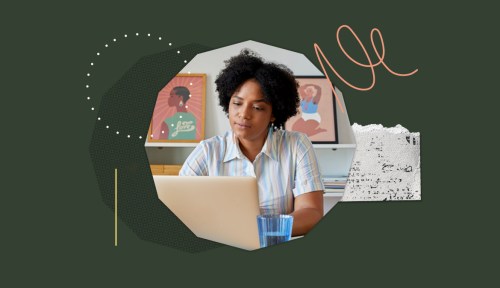Attention Deficit/Hyperactivity Disorder (ADHD) often calls forth the image of a white male student rambunctiously fidgeting at his desk. This is exactly what sprang to mind for Paige Bryan, public relations specialist, after she received her own ADHD diagnosis in her mid-20s last October. The stereotype for this neurodevelopmental disorder—which affects your ability to focus, organize and complete tasks, and regulate your behaviors—can have a significant and detrimental impact on people with marginalized identities, who may not see themselves reflected in a typically “white male” disorder. The truth is, ADHD can affect anyone, including Black women, but it doesn’t always look the same.
Experts in This Article
“Unfortunately, the systemic inequalities that exist in our society are the primary reason why there are cultural differences in the experience of ADHD,” says Tynessa Franks, PhD, a licensed psychologist at Bashful and Bright. “ADHD is most often diagnosed during childhood, and there is research showing that Black children—and girls in particular—regularly go undiagnosed or misdiagnosed for a variety of reasons. In fact, one study found that Black children in the United States are 70 percent less likely to receive an ADHD diagnosis than white children.”
The reasons for this are varied and complex. For one, school settings are often the first place that symptoms of ADHD are detected, and Black children may be in school systems that are understaffed or without specialists who can readily identify ADHD. Another issue is that Black children are often misdiagnosed as having other types of behavioral disorders due to healthcare provider bias, according to Children and Adults with Attention-Deficit/Hyperactivity Disorder (CHADD).
Additionally, if and when people from marginalized identities are finally diagnosed with ADHD, the effects of the long-term lack of treatment can be quite apparent, Dr. Franks says. “When Black girls are diagnosed, there is often a lack of resources for treatment. In addition, adult caregivers may be hesitant to trust the diagnosis and intervention offered by health-care providers due to documented mistrust of medical professionals in the Black community,” she says.
By the time Black girls become adults, these disparities are only magnified, says Dr. Franks, because at that point many women have endured the professional, social, and psychological impact of being misunderstood and untreated for many years. This is why it’s important to expand the narrative around ADHD to include the experiences and voices of Black women.
Ultimately, what helped Bryan to accept her diagnosis was finding an online community of people with similar experiences. She generously sat down with Well + Good for an interview to share her story.
This interview has been edited and condensed for clarity.
Well+Good: Before being diagnosed with ADHD, you never even considered you might have it. Why do you think that is?
Paige Bryan: I didn’t see myself in people who had ADHD. And I think in my lifetime, ADHD was something that young white boys who fidgeted a lot had. I was always like, ‘Oh that couldn’t have been me.’ I’m quiet, and I read books. I spend my time daydreaming and writing and reading about fantasy and stuff like that. But all of that was just me using escapism to hide what was going on. I was an intelligent child, but when I didn’t do well with math, I assumed that was my personality rather than signs that I have an atypical thought pattern.
I didn’t see myself as going through an entirely different set of hurdles that were just being completely missed.
W+G: Why was finding a community of like-minded people with ADHD so important for you?
PB: I’ve spent a lot of time trying to find more communities focused on ADHD because I feel like when I first got diagnosed, I was kind of just living in a bubble, and I had myself and my doctors that I was going off of. A lot of the ADHD platforms were informative but did not necessarily speak to my life experiences. It was really helpful to find a community of forums on Reddit and Discord, where I could see other people having similar ADHD experiences.
And a lot of it is just like, will I be able to get through this? Because I know that I’m working with a different stack of cards, and everyone is playing this one game—and I’m learning how to play it— but it’s not making sense to me because I’m playing an entirely different game, technically.
W+G: Is there any aspect of your experience as a Black woman that felt incongruent with the main narrative around ADHD?
PB: I definitely felt unsure if I had it or that it wasn’t true. Even though I’d taken the assessment, I couldn’t feel validated in my own struggles until I was able to find a community that reflected a similar experience to mine.
I’ve also been successful in my life and I am capable of things, but success also came at the price of putting my health second, and not really taking care of myself. At one point, I definitely felt like, okay, if I had just pushed myself harder, I would’ve been able to do this. Or if I had just taken a different approach, I would’ve been able to achieve this, and I might not necessarily be someone with ADHD. And I just kind of felt like I wasn’t adding up to that overall picture of the common narrative of ADHD struggles or the long-term issues that popular resources outline.
W+G: Is navigating ADHD in the professional world difficult for you?
PB: My job has thankfully been supportive. I took a medical leave to get my mental health in order after being super burnt out and run down. Since I’ve been back, I spent a month working reduced hours and having reduced clients, and they were just able to accommodate me in ways that are really supportive. And even now, I’m able to have structured breaks where I know that I’m not overexerting myself. I can take 30 minutes to either take a walk, go to the gym, or eat lunch. I can just be away from my computer in a way that’s organic, instead of trying to rush through the whole day because I overslept, or not eat because I’m just so zoned in on one thing. I’m actually able to take care of my body and provide myself with space.
I think before all of this when I wasn’t up-front about what I was struggling with, it was definitely really hard because I felt like I wasn’t meeting the expectations of my managers or the teams around me. I felt like I was a burden to everyone because it was hard for me to able to pick up what was needed—in my brain, there were too many moving parts going on.
W+G: What was it like to realize that ADHD is how your brain is wired, and it’s something you have to live with?
PB: I was talking to my mom about this, and I think the biggest hurdle is just constant paranoia that I’m not gonna be able to succeed in any job that I do because my brain is built differently. That I’m trying to make a round peg go into a square hole.
That has been a constant battle—trying to make myself fit into a way or think in a way that is not intuitive for me. I have to try pretty hard not to force myself to get things done the way everyone else does because I will be way more burnt out and depleted—I just work differently. Reminding myself that it’s okay is important.
W+G: Are there aspects of this part of yourself that you appreciate?
PB: I would say I’m a far more empathetic person with ADHD than I think I would be without it. I’m always considering how to take care of other people in my volunteer life. I really spend time learning about how to fundraise, learning how to take care of local communities, and thinking of ways that I can continue to support Black and brown communities on a local level. Things that give back to the community—that’s what really drives me and makes me the happiest.
I think I have a really unique communication and writing style, too. I tell detail-oriented stories that humanize characters in a way where the emotions they feel are easier to empathize with. I think that is a strength. It helps me connect with others in a lot of different ways.
A few things to keep in mind when seeking treatment for ADHD as a marginalized person
“Living with ADHD, regardless of cultural background, can be very isolating. If we add in the experience of being a Black woman, it can compound the difficulties that one might face,” says Dr. Franks. “Black women should trust their instincts about their functioning. If you know that your academic, work, and social functioning are not consistent with what you’re capable of, do not hesitate to get support. Seek out health professionals who can speak honestly about their cultural competence.”
Like Bryan, Dr. Franks says it’s important to be persistent in looking for communities that offer validation and connection around the experience of ADHD. One such community is Black Girl, Lost Keys, which was created to empower and guide Black women with ADHD, Dr. Franks adds.
Sign Up for Our Daily Newsletter
Get all the latest in wellness, trends, food, fitness, beauty, and more delivered right to your inbox.
Got it, you've been added to our email list.











